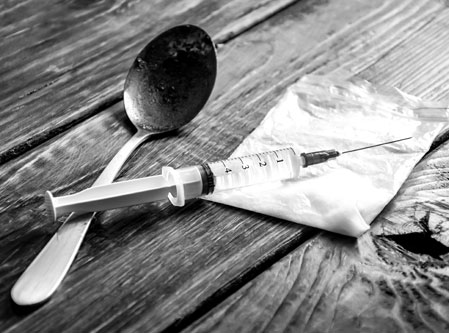What is Addiction
Substance abuse and addiction affects people of all ages, races, classes and professions; no one is immune. It is a chronic, relapsing brain disease, changing the way the brain works and affecting behavior. Addiction is defined by an uncontrollable urge to use opioids, resulting in drug seeking behavior that may increase risk of disease, financial ruin and destruction of families. Those who suffer from an addiction cannot simply stop using drugs for a few days and be cured. Most need ongoing care and support for successful recovery and to achieve sobriety. Without treatment and long-term support, addiction becomes progressive and leads to physical, psychological and social consequences.
Physical Consequences
The list of physical effects suffered by those in the grip of addiction is long, affecting every organ system from the skin to the heart. These conditions include, but are not limited to: infectious skin diseases, abscess, sepsis and septicemia, heart valve infection, bacterial endocarditis, thrombosis and inflammatory change in the vessel wall, toxic liver damage, acute and chronic hepatitis B and C, cirrhosis, HIV, weakened immune system, drug poisoning, toxic neuropathy, digestive disorders, malnutrition, hormonal imbalance, infertility and impotence, overdose, cardiac and respiratory arrest, edema, post hypoxic brain damage resulting in paresis, paralysis and other neurological deficits, tics, seizures, dementia and death.
Mental Health Consequences
Addiction not only affects the physical body, but also the individual's mental and emotional health. These in turn affect the ability to function in society and include:
- Impaired memory
- Sleep disorders
- Personality changes and aggressive behavior
- Loss of interest in everything not related to drugs
- Manipulative behavior
- Diminished responsible behavior
- Emotional numbness
- Weak will
- Unscrupulous behavior and dishonesty
- Moral deficit
- Anxiety and depression
- Psychosis and paranoia
- Suicidal tendencies
- Complete personality disintegration.
Social Consequences
The social impact of the physical and mental effects from addiction may lead to:
- Loss of joy in life, goals and aspirations
- Living at the expense of others
- Loss of job, mounting debt and financial collapse
- Damaged family relationships and divorce
- Tendency toward crime to solve problems resulting in difficulty with the law
- Increased risk of death resulting from fighting, car accident, overdose or suicide.
Treatment programs must begin with detoxification in order to implement the critical counseling and social support needed to treat the psychological aspects of addiction. The most successful programs from drug and medication withdrawal is medication-assisted treatment with longer acting formulations of naltrexone, to simultaneously treat the physical effects of addiction.
Understanding Addiction
The Brain and Pleasure
To understand how addiction happens, it is important to understand how the brain normally works. The human brain is stimulated by everything you do. When you do something you enjoy (such as eating delicious food), your brain releases chemicals called endorphins. Endorphins attach to opioid receptors in the brain, causing them to release a chemical called dopamine. Dopamine gives you a good feeling to reward you for doing something. This encourages you to repeat these behaviors.
The Brain and Opioid Use
Opioid street drugs (such as heroin) and opioid pain medications attach to some of the same receptors as endorphins. However, opioids cause the release of a greater amount of dopamine than normal activities do, causing a “high.” When the high ends, the brain craves this feeling again.

Developing Tolerance
Physical tolerance occurs when the brain has a diminished response to repeated use, requiring greater amounts of the drug to achieve the same results. In other words, with repeated doses of the drug, the brain doesn’t produce as much dopamine, so the euphoria is dampened. In order to achieve the same “high,” your brain needs more of the same drug.
Understanding Treatment Options
Medication-assisted treatment for addiction works by interacting with some of the same receptors in the brain triggered by drugs. When used with counseling, medication can help treat the physical effects of addiction.
Cortex
Counseling targets the cortex to help treat the psychological aspects of dependence. The cortex is responsible for:
- Comprehension
- Decision making
- Thinking
- Reasoning
- Planning
Limbic Region
Medication targets the limbic region to help treat the physical effects of dependence. The limbic region is responsible for:
- Basic drives or urges
- Reward
- Pleasure
The Psychological Benefits of Counseling
The psychological effects of addiction are profoundly powerful. That’s why addressing them is vital to recovery — especially at the beginning of this journey. Counseling teaches people effective recovery skills to help prevent relapse and can help with:
- Self-acceptance and personal growth
- Developing positive life skills and habits
- Coping with relapse triggers, stressors, and urges
- Reducing the urge to use opioids and alcohol
Counseling and A Strong Support Network Are Essential to Helping People Stay in Recovery
The Physical Effects of Addiction Can be Treated with Medication
Medications for treating opioid addiction work by interacting with receptors in the brain triggered by drugs. These medications can help treat physical effects and should be used with counseling.
There are three types of medications used with counseling to treat opioid dependence, including:
Understanding Treatment Options
Medication-assisted treatment for addiction works by interacting with some of the same receptors in the brain triggered by drugs. When used with counseling, medication can help treat the physical effects of addiction.
